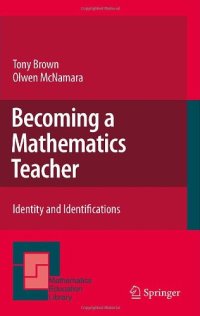
Ebook: Becoming a Mathematics Teacher: Identity and Identifications
- Genre: Education
- Tags: Mathematics Education, Educational Policy and Politics
- Series: Mathematics Education Library 53
- Year: 2011
- Publisher: Springer Netherlands
- Edition: 1
- Language: English
- pdf
This book is about people preparing to teach mathematics to children in the first half of their schooling. It is also about what mathematics becomes in a school context responding to insistent demands to raise standards. The book asks how aspirant teachers begin to think of themselves as teachers, and about mathematics in particular, when they have many years of experience as pupils in school behind them, which did not always leave a positive image of mathematics. How do they change how they are, or even who they are, as they proceed through a teacher education programme into their first teaching post, where mathematics is just one of many subjects to be taught? They will encounter diverse and complex social demands that cannot necessarily be reconciled, since the work of schools is targeted at enabling pupils to participate in a rapidly changing world where consensus on educational objectives seems difficult to achieve. Conflicting priorities can result in teachers being pulled in many directions, where their personal aspirations confront an official story that portrays the journey into teaching as a sequence of criteria to be fulfilled. Centred on over 200 hours of interview data from government-funded studies directed by the authors the book documents teachers over a five-year period, from the outset of their training to the end of their first year of teaching in a school. These interviews coincided with a major national curriculum initiative that through prescriptive and detailed regulation set the characteristics of a good teacher and the content of mathematics to be taught. Aimed primarily at teacher educators the book will also appeal to researchers across the field of education for its unique theoretical perspective drawing on contemporary psychoanalytical theory in portraying the identities that teachers come to occupy, and the forms of mathematics with which they identify. It also presents a vivid account of what educational policy implementation looks like through the voices of teachers building their practices.